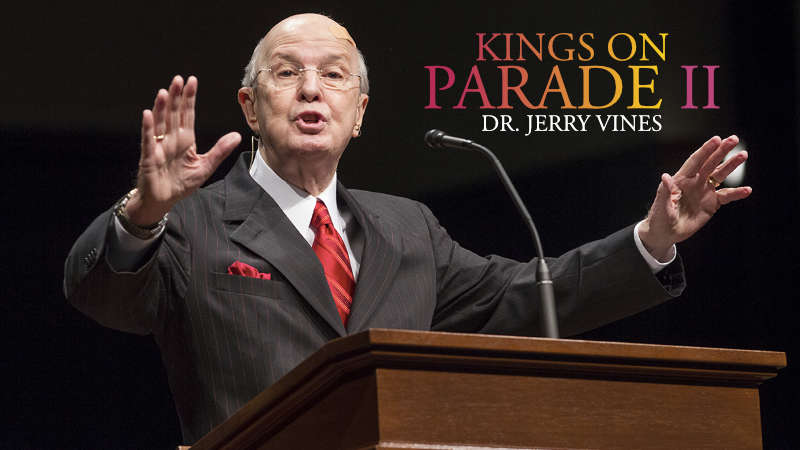
Saul, The People’s King. 1 Samuel 9–31. By Dr. Jerry Vines
Introduction: Saul was the first king chosen by the children of Israel. He had the potential to be one of the great characters in the Old Testament but was not.
His Positive Beginning
Saul was a tall and handsome man, head and shoulders above everyone (9:2). Saul’s physical appearance could have been used in a positive manner, but it was a mistake for Israel to choose a leader based on physical characteristics alone.
He didn’t seem to have a lot of spiritual awareness at first in 1 Samuel 9, when he looked for his father’s donkeys. His servant told him about a man of God, an honorable man. His servant spoke of Samuel, Israel’s spiritual leader, yet Saul didn’t seem to know him (9:6).
After being anointed king, Saul appeared to have spiritual potential.
Samuel told Saul he would meet a company of prophets, that the Spirit of the Lord would come upon him, that he would prophesy, and that he would be turned into another man (10:5–6). Samuel’s words came true, and God gave him a new heart (10:9–10).
Some have said that was Saul’s conversion experience. It sounds like he received a regenerated heart, but later evidence will cause you to question that. God possibly was just equipping him for the office of king.
The Bible said he prophesied, but that doesn’t prove he was saved. Balaam in the Old Testament prophesied, but he was not a converted man. In the New Testament, the high priest Caiphas made a prophecy but was not a converted man.
Saul did appear humble in the beginning. When it was time for him to be anointed as king, Samuel got his family together, but they couldn’t find Saul (10:21). He hid himself among the stuff (10:22).
He was not a vindictive man in the early years. The children of Belial did not want him to be king (10:27). Later on, when a battle was won, some of his army wanted to take revenge on them. Saul didn’t let them (11:12–13).
His Problematic Behavior
When we unfold his story we see problematic behavior. In chapter 13 the Philistines have gathered for battle. Saul waited seven days for Samuel to come so an offering could be made to the Lord before the armies went into battle, but Samuel didn’t show up (13:5–8).
Instead of waiting for Samuel, Saul displayed impatience and made the sacrifice himself (13:9).
Sometimes waiting is a test. Saul was a king, not a priest. As soon as he finished, Samuel came, and he blamed Samuel for not coming on time (13:10–11).
He next blamed his son Jonathan. The Israelites were in battle, and Saul issued a foolish command that basically said the soldiers could not eat anything, or they would die (14:24).
Jonathan did not hear the command. He ate some honey and was refreshed (14:27–30). Saul discovered what Jonathan did, blamed him, and was ready to kill him. The people stopped him (14:45).
It gets worse. God commanded the Israelites to utterly destroy the Amalekites (15:1–9). It was a harsh sentence, but sin had to be dealt with. Saul disobeyed God.
He spared the best animals and the king. Samuel came and questioned Saul; Saul first lied and said he obeyed. Then he blamed the people (15:13–15).
The Lord said to Saul through Samuel in verses 22–23, “Behold, to obey is better than sacrifice, and to hearken than the fat of rams. For rebellion is as the sin of witchcraft.” The Lord then states He is taking the kingdom from Saul and giving it to his neighbor, talking about David (15:23–29).
His Persistent Bitterness
David stepped into Saul’s life in 1 Samuel 16. How Saul responded to David showed a pattern of persistent bitterness and a downward spiral in his life toward degradation and shame.
At first Saul was blessed by David’s songs. The Lord had departed from Saul, so he went into moods of deep depression. David played his harp; Saul was refreshed, and the evil spirit left (16:23).
Saul started off with love for David (16:21). Chapter 17 is the story of David and Goliath. In chapter 18, David came back from battle and the women started singing that Saul had “slain his thousands, and David his ten thousands” (18:7 KJV). Saul kept an eye on David from then on (18:9).
Bitterness and envy set in. Saul set out to destroy David. Saul moved from loving David to hating David.
His Pitiful Burial
Along the way Saul said, “I have sinned.” But he didn’t mean it. The difference between David and Saul was that when David sinned, he deeply repented. Saul never repented.
Chapter 28 is an astonishing chapter. Saul disguised himself, consulted the witch of Endor, and asked her to “Bring me up Samuel” (28:11).
God had departed from Saul. He was so desperate to get a message from the spirit world that he knocked on the door of hell.
The Bible specifically forbids involvement in the occult.
I believe Samuel came up, but the witch had nothing to do with it. She was as scared as anybody else was. Basically Samuel’s message was that Saul would be a dead man the following day (28:15–25).
Saul’s last battle is in 1 Samuel 31. He was mortally wounded (31:3). He knew how vicious and violent the Philistines were, so he asked his servant to kill him.
His servant refused, so Saul fell on his own sword and committed suicide (31:4). His sons died also. The Philistines cut off his head, stripped off his armor, and nailed his body to a wall (31:8–10). Sin always pays off sooner or later.
Conclusion
Saul, who started with such great opportunity, ended up a disgrace and a shame. It’s a sad thing to see the wreckage of lives that had such great potential.
The prayer of Dr. William Culbertson III, president of Moody Bible Institute many years ago, was pray to end well.
Jerry Vines
The Dr. Jerry Vines is a native of Carrollton, Georgia. He was educated at Mercer University (B.A.), New Orleans Theological Seminary (B.D.), and Luther Rice Seminary, (Th.D.). He has is a Baptist pastor and preacher for over 60 years






